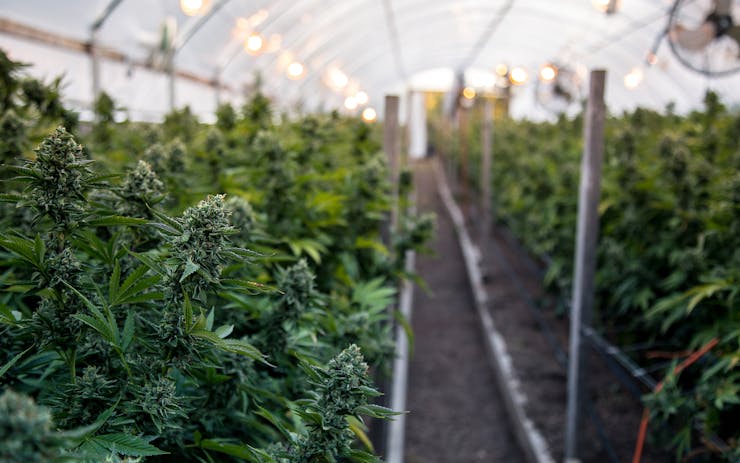California’s leading cannabis farmers lobbying group filed suit against the state’s Department of Food and Agriculture on Tuesday, seeking to overturn a recently adopted rule that allows for cannabis farms of near-unlimited size.
The California Growers Association has been one of the loudest critics of the CDFA’s emergency regulations for cannabis cultivation since their release in November 2017.
California’s marijuana legalization law, Prop. 64., was approved by more than 57% of voters in November 2016. Part of its sales pitch was that it protected small cannabis farmers and was not a cover to usher in an age of corporate cannabis dominated by industrial-scale growers.
'Our concern is very narrow in scope, but the implications for California growers are huge.'
Prior to Prop. 64’s passage, the state Legislature capped legal medical marijuana farms at four acres. That limit was included in the Medical and Adult Use Cannabis Regulation and Safety Act of 2016 (MAUCRSA). A provision delaying the licensing of large-scale cannabis farms until 2023 was baked into Prop. 64. The idea was to give existing craft-scale farmers a five-year head start to upgrade their operations and establish their brands.
When the California Department of Food and Agriculture (CDFA) issued its cannabis farm licensing regulations, scheduled to go into effect Jan. 1, no farm larger than one acre was eligible for a single permit.
But in an apparent loophole, those same regulations set no limit on the number of permits that a “small” farm licensee can obtain. Critics, including the California Growers Association, say that allows a single permit-holder to “stack” an unlimited number of “small farm” licenses and create a cannabis megafarm.
That, says the Gowers Association, violates the intent of Prop. 64 voters, as well as the Legislature, and threatens those areas of the state reliant on small-scale cannabis cultivation with “devastating” economic ruin, according to the complaint filed Tuesday in state court in Sacramento.
Growers Claim the Rule Breaks State Law
The suit asks the court to declare that CDFA’s rules violate state law. The Growers Association also asks the court to prevent the CDFA from issuing small-cultivator medical cannabis grow permits in excess of the four-acre cap in MAUCRSA. (The full complaint is embedded at the end of this story.)
“Our concern is very narrow in scope, but the implications are huge,” said Hezekiah Allen, Cal Growers’ executive director, in a statement released Tuesday.
Shop highly rated dispensaries near you
Showing you dispensaries nearIn the organization’s eyes, CDFA is “doing a good job… generally,” but for Cal Growers’ 1,000 members—many of whom are already grappling with plunging wholesale cannabis prices, even as retail prices soar—the prospect of competition from large-scale megafarms is seen as a career-wrecking dealbreaker.
“Our government has checks and balances for a reason,” Allen added. “CDFA’s regulatory decision allows [large] interests to quickly corner the market, while tens of thousands of small and mid-sized businesses are still working to fight local bans, raise capital, or establish operations in compliance with new rules. We could not stand by while a single regulatory decision threatened the future of so many hardworking Californians.”
A spokesperson for CDFA could not be reached for comment late Tuesday.
Permanent Rules Are Still On Their Way
The ground rules for California’s estimated $7 billion marijuana industry are still in flux. The emergency rules issued in November are only good for a few months, until permanent rules are adopted by state lawmakers.
Several members of the legislature have previously voiced their displeasure with CDFA’s big-farm cultivation loophole.
“Regulating cannabis and protecting small farmers will become exceedingly difficult if CDFA doesn’t close the loophole they created,” state Sen. Mike McGuire and Assemblyman Jim Wood, who represent cannabis-producing areas of Mendocino and Sonoma counties, wrote in a Dec. 4 letter to CDFA.
Local governments, including the Mendocino Board of Supervisors, have also voiced their displeasure with the current arrangement.
CDFA still hasn’t explained the loophole’s genesis. Nor has it explained the discrepancy between a draft environmental impact report—released days before the emergency regulations, which included a one-acre cap—and the final regulations, which had no cap.
Lobbyists for some of the state’s largest cannabis growers had contact with CDFA officials in the months leading up to the rules’ release, public records show, but it’s unclear what impact they had.
Here is the full complaint filed Tuesday by the California Growers Association:
California Growers Assn. v. California Dept. of Food and Agriculture — Complaint by Ben Adlin on Scribd





